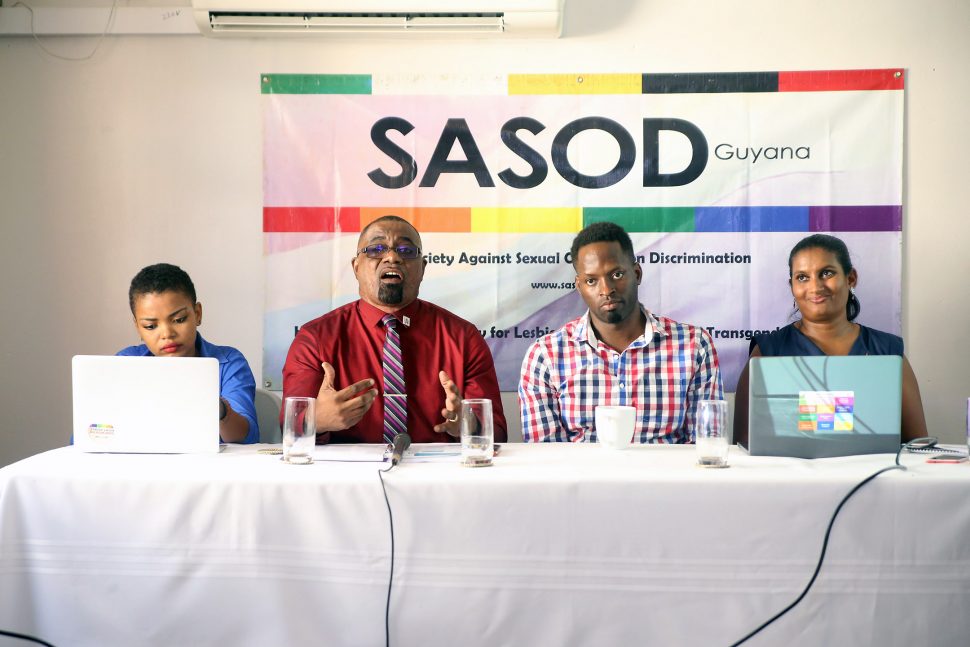Following a survey of key populations, the Society Against Sexual Orientation Discrimination (SASOD) is calling on the government to include Pre-Exposure Prophylaxis (PrEP) as part of its combination prevention approach for adult HIV infections.
The Assessment of Knowledge, Attitudes and Delivery Preferences for HIV PrEP among Key Populations in Guyana was conducted via focus groups in regions Three, Four, Five, Six and Ten, with financial support from the International HIV and AIDS Alliance’s Rapid Response Fund.
One of the key findings, presented on Thursday at a media launch of the assessment, is that in Guyana knowledge of PrEP appears to be minimal, with 60% of the 47 participants stating that they did not know of PrEP, while a significant number of those who claimed to be aware of the option were actually confusing PrEP with post-exposure prophylaxis (PEP).
Once made aware of the option, several participants noted that “anybody who was HIV negative, having sex and willing to take it,” should have access to PrEP, Principal Investigator Dr. Nastassia Rambarran told reporters.
Rambarran said the use of PrEP with tenofovir/emtricitabine (TDF/FTC) for the prevention of HIV transmission has been proven effective and safe in High Risk groups.
Efficacy of PrEP has been recorded at levels of 90% to 98%, with a resistance of 1%. Side effects associated with the treatment include gastrointestinal issues, reduced bone density and affected kidney function but these have all disappeared once use of the medication stopped.
Following research on its effectiveness, the World Health Organization in 2014 recommended PrEP as an additional HIV prevention choice for groups, such as men who have sex with men and transgender women. This recommendation was extended to all groups in 2015.
Rambarran noted that despite this recommendation and a 2015 promise from all Caribbean governments to increase PrEP demonstration projects, actual implementation has been negligible. To date, only The Bahamas and Barbados provide free of cost PrEP to at-risk individuals.
In 2015, the call to action of the Second Latin American and Caribbean Forum on the Continuum of HIV Care specifically directed Latin American and Caribbean (LAC) countries to adopt and progressively implement their own combination prevention packages and access to HIV diagnosis in line with the international recommendations of the WHO.
The call committed to the global target of providing three million at-risk persons with PrEP. Current level of compliance with this target stands at 2%.
However Joel Simpson, Managing Director of SASOD and co-investigator, stressed that “PrEP is not a magic bullet.”
“I’m not advocating replacing condoms with PrEP. There are a whole other range of STIs [sexually transmitted infections] condoms will protect you from. We advocate the use of PrEP with condoms,” he stressed.
Director of the Pan-Caribbean Partnership on HIV and AIDS (PANCAP) Dereck Springer was further explained that Guyana has an opportunity to use this survey to inform PrEP delivery. “You now know people are willing to use PrEP,” Springer noted.
Asked about the possible financial implications of providing PrEP, Rambarran indicated that a month’s supply of the on brand product in Barbados cost US$35, while the generic option is US$40. She further noted that the drugs used in PrEP are currently being made available as part of HIV treatment so the cost of making it available for prevention should be negligible in the short term.
“Invest in prevention so in the long term you will have less persons becoming positive and reduce the number of persons who need to be treated for all of their lives,” Springer added.
He further indicated that his organization is in negotiations with an unnamed pharmaceutical company which would allow Caribbean governments as a block to purchase PrEP at a cost of approximately US$10 per month’s supply
Simpson noted that SASOD is now moving to have a meeting with key figures in the Public Health Ministry with the view to having PrEP use included as part of the country’s 2019 HIV prevention strategy.






